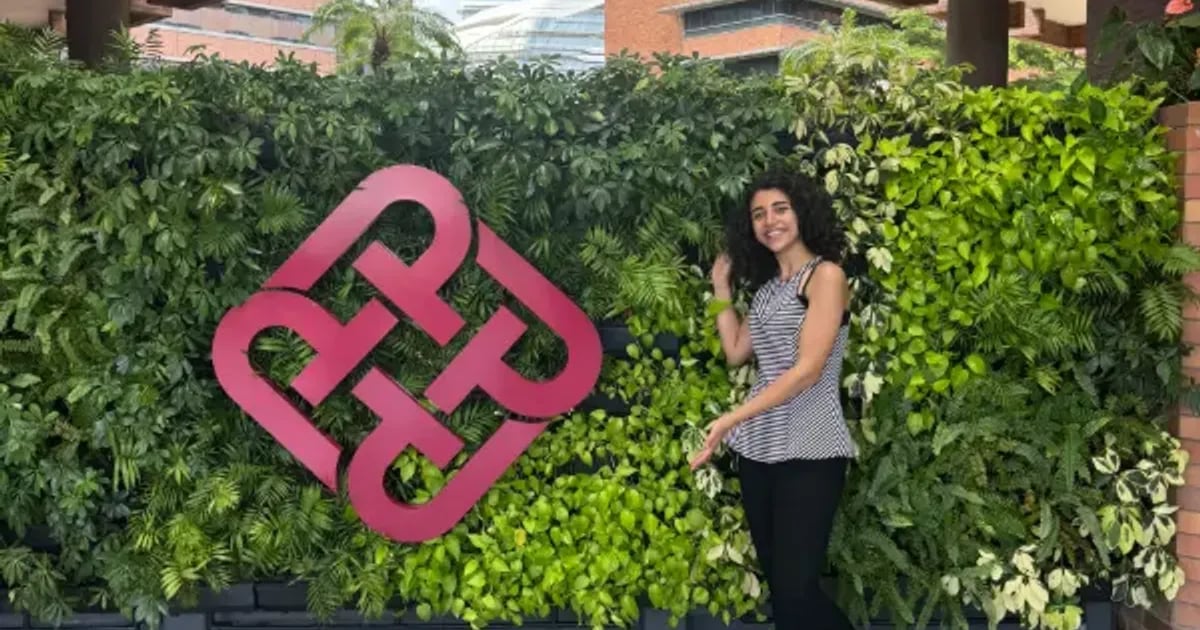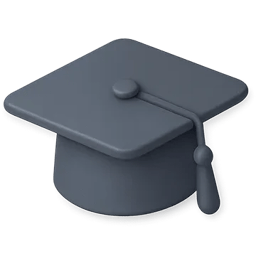Introduction
Hi, I'm Meriam from Tartous, Syria, and I am currently studying at Hong Kong Polytechnic University. I'm definitely an extroverted person; you might see me randomly stopping someone on the street to have a conversation or ask some questions. I'd like to say that I'm also a very optimistic person, and I think that's what allowed me to push through the hurdles of the bad circumstances that we experienced in Syria, especially in Tartous. I'm studying Data Science and AI, and outside of class, I'm an active person. I like to go outside, explore the city, do some sports, and walk.

Why I decided to study abroad
The education in Syria is not the best if you want to make the most of your potential as a person. You start to see that you can do more than what's available, then think: "Why should I limit myself to the circumstances and the resources that are available? Why can't I try to open more horizons for myself?" And that, I think, is why every Syrian student chooses to study abroad. There is such huge potential in Syrian youth, but the resources in our country are not the best, especially since it is not a very stable country after the war. To me, due to that and the chaos that happened recently, specifically in my area, going abroad was THE goal.
How I chose Data Science and AI
I’ve always been good at math and problem-solving. At the same time, I'm an extroverted person. I like socializing and interacting with people, so working in groups is my thing. And basically, data science is a field that combines these two things: being a technical person and having the ability to explain concepts and ideas to your team, whatever team you're in. You analyze data, practicing your mathematical and problem-solving skills, which gives you insights that you take and convey to whatever team you're working with. Data science has both sides of me: the social and technical.
Was there a specific reason to choose Hong Kong Polytechnic University?
To be honest, no. I first applied to the U.S. as an international student who needed full, all-inclusive financial aid, mentored by the Syrian Youth Empowerment Initiative (SYE) throughout the process. I got into Indiana University Bloomington, but I did not receive enough financial aid there. After the U.S. decisions were out, I got nominated by SYE to another program called the Second Chance Program, which helps high-achieving, low-income students applying to study abroad from third-world countries. Specifically, those who had already applied abroad but a technical barrier (whether financial aid, visa issues, or otherwise) prevented them from reaching their university.
Second Chance works with these students on a very strict schedule after April 1st. So you start applying to universities after April 1st for the cycle of the same year. For example, I applied after April 1st, 2025, and got in to start my studies at the beginning of September 2025. We apply to partner institutions that agree to provide enough scholarships to students even at a late time.
I applied to Hong Kong Polytechnic University and The University of Hong Kong, and I got into Hong Kong Polytechnic University first, so I had to withdraw all my other applications. PolyU is known for trying to include AI in whatever field the students are studying, whatever they do, which is exactly what I wanted in terms of academics and work.
If you know that famous photo on social media that shows "Your plan vs. God's plan," I feel that represents my journey. I don't think that any other place would have been as perfect for me as PolyU.
Hong Kong Application Process
It is more similar to the UK admission process. For example, in your personal statement, you're not writing your personal story as you are used to in a U.S. application; rather, you're showing them how much of an academic monster you are. You're telling them that, hey, I did this work outside of the classroom to also develop better skills in academics and leadership. So basically, it's more academic-oriented. You need to show all of the skills you learned, whether inside or outside the school, that would allow you to be a great student. In the PolyU application, there was a place for only three extracurricular activities that you need to talk about very specifically. They actually have a list of the common extracurricular activities that international students do. It's okay if you didn't find any of your activities there, but if you did, that's great.
One of my activities was the International Astronomy and Astrophysics Competition. It was an online competition that I participated in, and I was happy to know that it was on their list. I also included debate and the Olympiad. I talked about my participation in the National Olympiad and how it led me to start a competitive programming club at my school. I did a two-in-one there. For each activity, you need to submit a certificate proving your achievement.
Adaptation to life in Hong Kong
I went from Syria, where everything is completely chaotic, to Hong Kong, where everything is super organized. That stressed me out the first week.
For example, one problem that I faced was that in Syria, our teachers and counselors use their personal emails for contacting universities, and our schools do not have proper email domains. My counselor had to send a certificate of mine, but the email raised doubts, so I had to contact SYE since they have an official email domain to verify the information sent.
In terms of social life, it wasn't very hard. But again, I am a proactive social person. Generally speaking, though, people won't initiate a conversation with you if you do not go yourself and start one. I know some people who were struggling with this, but personally, I was okay, especially since whenever I talked to anyone, they usually turned out to be really nice.
One shock of mine was that Hong Kong is not that much of an English-speaking city. I went there thinking that if I stopped anyone on the street and talked to them in English, they would definitely understand and be able to respond. That turned out to be wrong! Not everyone speaks English, especially elderly people. And some people have a very heavy accent that you do not understand what they mean. This is, however, in day-to-day life, not at university. The university is completely English-speaking.
Balancing academics and social life
In my university, we have something called the add/drop period, which is the first two weeks of the term, where you can add or drop any of your courses. So, for example, in the second week, you realize that you want to take a specific course, but you don't have it in your courses, you can add it. And maybe you feel that you don't like a specific course after starting, you can drop it if you want. Usually, professors try not to have that many assignments or work during these two weeks, which makes it easier. Since I only did my first two weeks, things are quite manageable. However, talking about the next period, I am not that scared because professors are super supportive. I honestly did not expect them to be this supportive and kind. Whenever they see that you're a lost international student, they're always trying to help you as much as they can and get you engaged and aware of the plenty of resources around. So with the academic advisor who's there to help with anything I need, the resources and support of the professors, I think even if the workload gets really hard, it would still be manageable because everyone is there to support.
Networking tips
Don't be afraid of being awkward. There will always be some awkward moments; just go through them and try to start a conversation out of that. People actually love speaking about themselves and their experiences; you just need to ask.
Finances and Scholarship
I got a full-ride scholarship. The cost of living depends on how much you spend. In Hong Kong, there's a huge difference between local places and tourist places, so if you manage to eat at local places and buy your things from local shops, the scholarship would be enough, and you wouldn't need any part-time job. But if you are willing to spend more, you'll need to work. One really cool thing about Hong Kong is that you do not have a limit on how much you can earn per month. So, for example, if you've gotten an internship for a thousand USD, you can go for it. If you got a part-time job that pays well, you can go for it as long as it does not interfere with your courses. They also have work-integrated education. So you are encouraged to pursue opportunities like internships, paid or unpaid, part-time jobs, being a teaching assistant, or any type of thing that would include you in the marketplace and give you hands-on experience.
Visa Process
It's an e-visa, so it wasn't that bad. I honestly expected to have a lot more problems. There's an online form that you need to fill out. There is this one thing, though, that you have to pay an extra amount to apply for a visa through the university, because this way it will be prioritized and it will take less time.
Advice for studying and applying to PolyU
The application takes a lot more than a day, so start early. Even filling out your marks can take a lot of time. One other thing is to be proactive. Ask whenever you need, reach out to people, don't be scared. One little question could change your whole life.
To be honest, everyone always told me to start early, but I don't listen, and that's a bad thing. So maybe I wish something had pushed me harder to work earlier.
Biggest support and motivation
The first thing was that I thought of education as a chance of survival. That pushed me a lot. The other thing is my father. He did a great job when it came to motivating me and keeping me going. He used to say, "I know you're suffering now, but I trust that you have something hidden inside you, and you're going to get to the place you want to." Although we usually know these things deep down, it feels different hearing it from others.
Most useful skill in this process
It's not an academic skill, but being proactive helped me a lot. When you leave an impression on people, they are willing to make some extra effort to help you.
Message for Syrian Youth
Don't ever feel like whatever you're trying to pursue is too far from you or you don't deserve it. You are worthy of your dreams, even if they feel too far; they're closer than you think.


